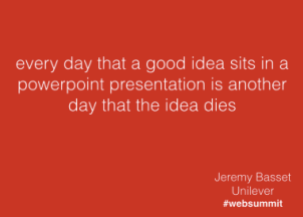
Phil Libin, CEO Evernote
I missed his presentation last year, but my colleague recommended him as a speaker and a visionary, so this year I was determined to be in the room.
His vision comes down to; make work less sucky.
Evernote are ahead of the curve on productivity tools. They see the free version as their main version, and focus on getting people to “stay rather than pay”. People use the free version for a long time before buying into the product. They’ve also seen that individual users are often their best leads for enterprise to use Evernote.
His advice to entrepreneurs and developers; make something useful, see if people will like it and stay on it. Their best test of whether will use a new feature or tool is whether their colleagues use it.
Lew Cirne
Lew Cirne is the founder and CEO of New Relic, a company founded on the principal of making data visual in a way that is useful.
He had the quote of the day
Life is too short for bad software
The Role of Technology in Filmmaking: John Underkoffler and Tim Webber
John Underkoffler from Oblong worked on Minority Report and went on to make a real version of some of the coolest tools shown in the movie. Tim Webber from Framestore won the Oscar for visual effects in the movie Gravity. What I loved about this discussion was the emphasis on telling a story. The story comes first and the technology is tool to tell that story.
In the future they see the possibility to integrate with reality tools, but that this has to work in parallel with the story rather than detracting from the story. It occurs to me that at some point movies with virtual reality tools will start to blur the line between movies and games.
The next technology challenge is CGI “humans” that are believable and sustainable for a whole movie.
One key to their success is a very interesting skill that has growing importance in all sorts of companies. Movies are now made across several teams located in different countries, so collaboration in virtual environments has become an essential skill.
Eva Longoria
Room starts to fill up – this might be the closest geeks ever get to genuine stars.
This is not the most original of interviews, some of the questions seem to have been cribbed from an old Cosmo magazine. But Eva Longoria is gracious and funny and she gets her points across.
- in the cycle of poverty the best intervention is education
- women start biz at 3x rate of men but have trouble getting access to expertise and capital (in US)
- her foundation starts addressing these issues
By the end of the 20 minute interview there is a crowd at the front in a photo frenzy.
Gary Marcus
Artifical Intelligence has been disappointing, all the best stuff is always promised as something 20 years away – but we’ve been saying that for 50 years. As Peter Thiel once said “We wanted flying cars, we got 140 characters”
Privacy Discussion
Last year there was a panel discussion in a tiny hard-to-find room, that ended up over-crowded with people peering in through the door. This year it’s on the main stage. Privacy is a real issue, and a challenge for all companies working in digital. An ongoing challenge in my work in social media.
Legal rep for NSA vs CEO from Cloudflare on the basis of privacy in the digital world; neither of them deny the importance of privacy and the challenges faced. But the discussion is where does the responsibility lie?
Peoples’ expectations have changed, many users will sacrifice some privacy for free services. Facebook and Google have a business model that exploits this, selling aggregated data to advertisers. But this is not everyone’s business model; Apple, Cloudflare and Ello are showing that.
There seems to be an ongoing tension between security and privacy; is this inevitable?
Drew Housten
The CEO and founder of Dropbox, a tool I’ve loved and used for years.
He begins by talking about a tennis ball and the number 30,000
The tennis ball represents obsession – think of a dog at play, and 30,000 represents the number of days you have have in your life. Realising at the age of 24 he’d used up a third of them jolted him into starting out as an entrepreneur.
As Dropbox became successful he got a call; Apple were interested. He famously didn’t sell. When asked what number was on the table, he admits they never got as far as stating a number. Before the meeting someone told him that if he didn’t want to sell the company then don’t discuss selling the company.
When asked about competition he answers almost casually “We’ve always had competiton”, but manages to give the impression that being seen as a competitor to giants such as Google et al is a sign of success.
There was an announcement earlier – Dropbox and Microsoft have agreed to work together and produce deep integration between their two products. This leads to a question about equal pay – given the Microsoft CEO’s advice to women to rely on “karma” for salary equality. His answer is unequivocal “two people doing the same work should get the same money regardless of gender”.
And with a round of applause I wander off to find a Dublin shuttle bus. The driver roars “it’s two euro and tirty-five cents, all Dublin buses take coins only” and when we look surprised “this information is all on the web”.
































